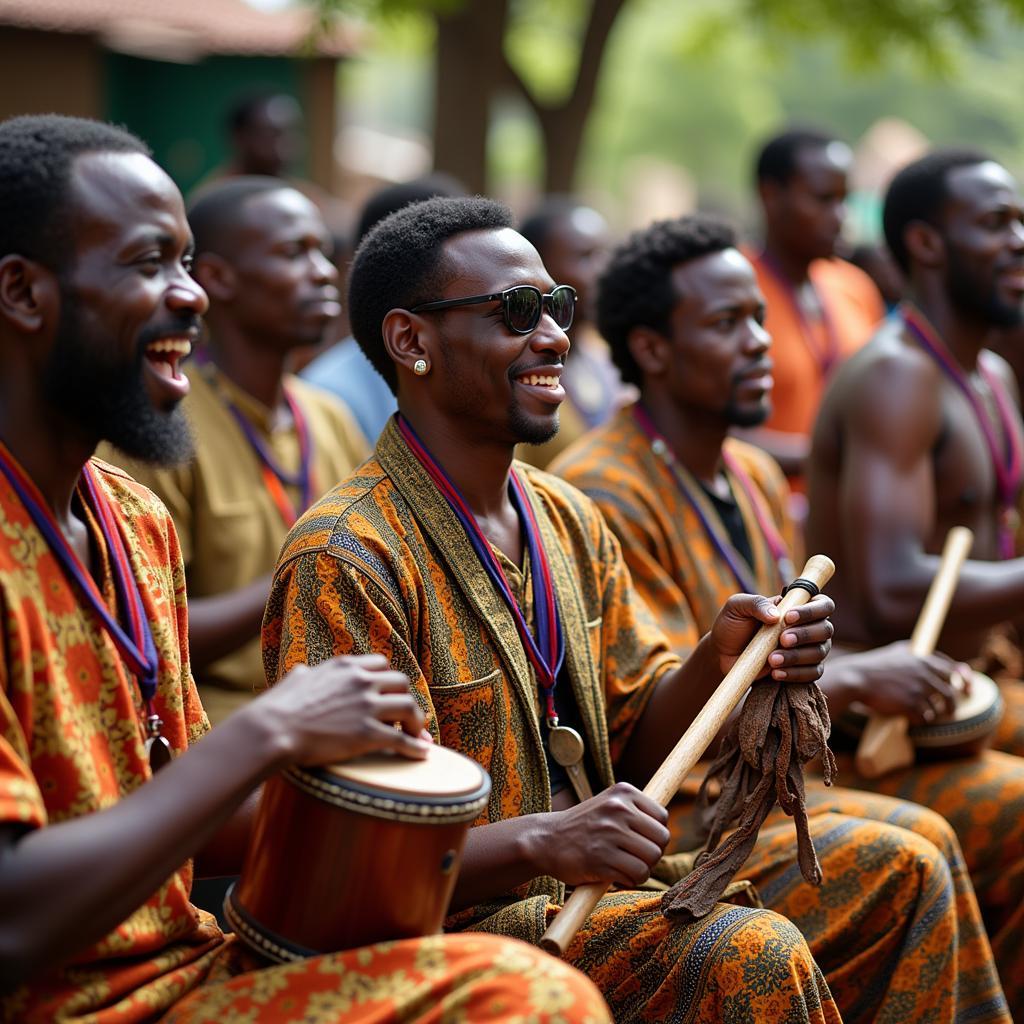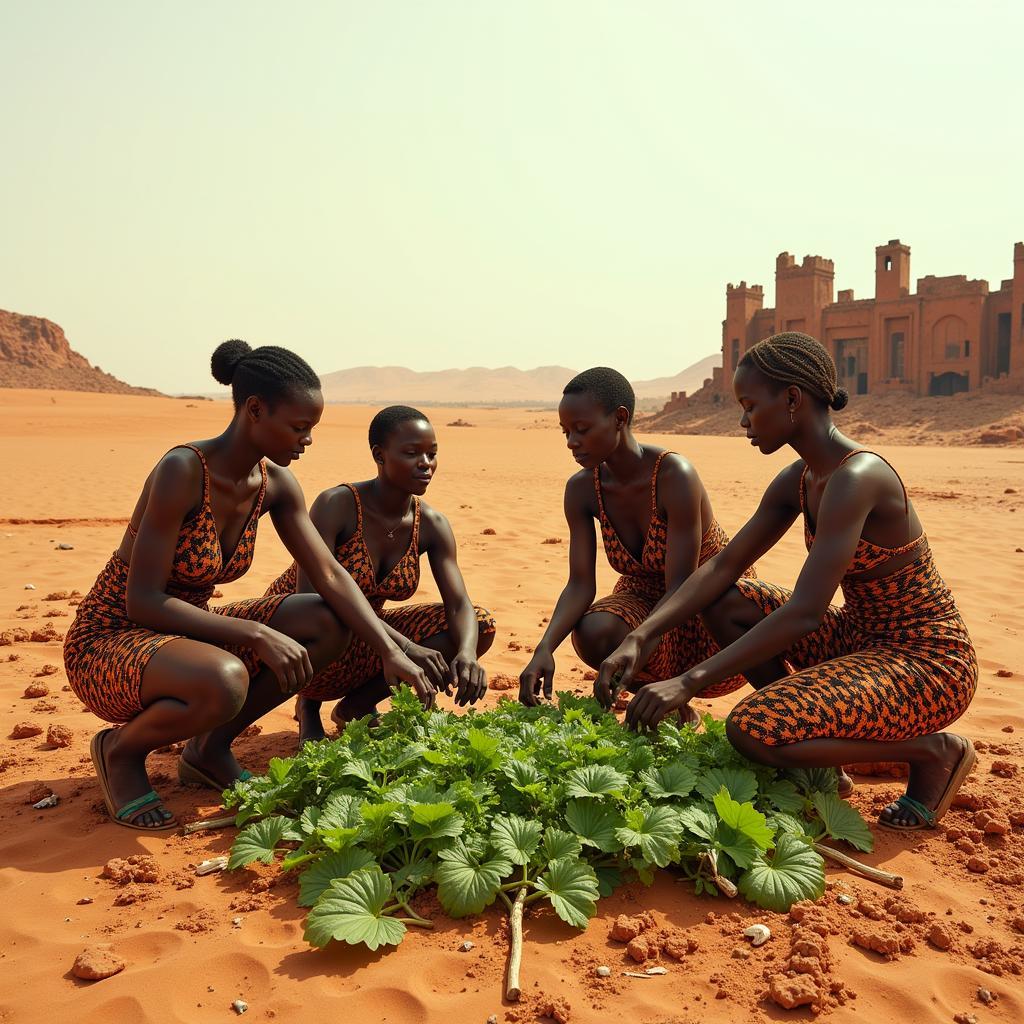Exploring the Vibrant World of African Craft Work
African Craft Work represents a captivating blend of tradition, artistry, and cultural expression. From intricate beadwork to boldly patterned textiles and expertly carved wooden sculptures, African artisans have honed their skills over generations, creating pieces that are both functional and aesthetically stunning. This article delves into the rich tapestry of African craft work, exploring its diverse forms, cultural significance, and the stories it tells. We’ll journey across the continent, discovering the unique crafts that distinguish each region and the talented individuals who keep these traditions alive.
The Cultural Significance of African Craft Work
African craft work is deeply intertwined with the cultural identity of various communities across the continent. These crafts are not merely decorative objects; they often hold symbolic meaning, representing ancestral legacies, spiritual beliefs, and social status. For example, masks play a vital role in many African cultures, used in ceremonies, rituals, and theatrical performances. They often depict deities, ancestors, or mythical creatures, embodying the spiritual connection between the living and the spirit world. Similarly, textiles, adorned with vibrant patterns and symbolic motifs, can communicate clan affiliations, social roles, and historical narratives. These crafts are a tangible expression of cultural heritage, passed down through generations, preserving and celebrating the rich tapestry of African traditions.
Beadwork is another prominent form of African craft work. Used for adornment, it can signify wealth, marital status, or social standing. The intricate designs, often incorporating symbolic colors and patterns, reflect the creativity and skill of the artisans. You might be interested in finding authentic african beadwork for sale.
A Journey Through African Craft Traditions
From the intricate wood carvings of West Africa to the vibrant beadwork of East Africa, each region boasts its own distinct craft traditions. Let’s embark on a journey across the continent, exploring some of the unique artistic expressions found in different areas.
West African Crafts: A Legacy of Skill and Artistry
West Africa is renowned for its skilled woodcarvers, who create intricate masks, sculptures, and furniture. These pieces often feature stylized human figures, animals, and geometric patterns, reflecting the region’s rich artistic heritage. Ghana, for example, is known for its Akan talking drums and kente cloth, while Nigeria is famous for its Yoruba masks and bronze sculptures.
East African Crafts: A Tapestry of Colors and Textures
East Africa is celebrated for its vibrant beadwork, colorful textiles, and woven baskets. The Maasai people of Kenya and Tanzania are known for their intricate beadwork, which adorns clothing, jewelry, and ceremonial objects. Ethiopia, with its long history of weaving, produces beautiful handwoven fabrics, often incorporating intricate patterns and symbolic designs.
Southern African Crafts: A Fusion of Tradition and Innovation
Southern Africa boasts a diverse range of craft traditions, including intricate basket weaving, pottery, and beadwork. The Zulu people of South Africa are known for their distinctive beadwork and woven baskets, while the Himba people of Namibia are recognized for their unique hairstyles and body adornment.
Many talented individuals are contributing to the preservation and promotion of African art. The african film institute of volker is one such organization that supports and celebrates African creativity.
What are some popular types of African craft work?
Some popular types of African craft work include wood carving, beadwork, textile weaving, pottery, and basketry.
Where can I find authentic African craft work?
Authentic African craft work can be found in local markets, art galleries, and online platforms specializing in fair trade products. You can also check out african clothing boutique for unique clothing and accessories.
The african fellowship program offers opportunities for artists and craftspeople to develop their skills and share their knowledge.
Conclusion
African craft work is a testament to the continent’s rich cultural heritage and artistic ingenuity. From the intricate carvings of West Africa to the vibrant beadwork of East Africa, these crafts tell stories of tradition, spirituality, and community. By supporting African artisans and appreciating their creations, we contribute to the preservation of these valuable cultural traditions for future generations. Let’s continue to explore the vibrant world of African craft work and celebrate the talented individuals who keep these traditions alive.
FAQ
-
What makes African craft work unique? Its deep connection to cultural identity, spirituality, and ancestral traditions.
-
What are some common materials used in African craft work? Wood, clay, beads, textiles, and natural fibers.
-
Where can I learn more about African craft work? Museums, cultural centers, and online resources offer valuable insights.
-
How can I support African artisans? By purchasing their work directly or through fair trade organizations.
-
Are there opportunities to learn African craft techniques? Yes, workshops and classes are available in various locations.
-
What is the significance of masks in African culture? They often represent deities, ancestors, or spirits and are used in ceremonies and rituals.
-
How has African craft work evolved over time? While maintaining traditional techniques, contemporary artists also incorporate modern influences.
Common Scenarios and Questions
-
Scenario: A tourist wants to buy authentic African crafts as souvenirs. Question: Where can I find reputable sellers of genuine African craft work?
-
Scenario: A student is researching African art for a school project. Question: What are the key characteristics of different regional styles of African craft work?
-
Scenario: An art collector is interested in investing in African art. Question: How can I identify high-quality and valuable African craft pieces?
Further Exploration
For more information on African art and culture, explore resources on African masks, textiles, and traditional music.
Contact us for assistance: Phone: +255768904061, Email: kaka.mag@gmail.com, Address: Mbarali DC Mawindi, Kangaga, Tanzania. We have a 24/7 customer service team.



